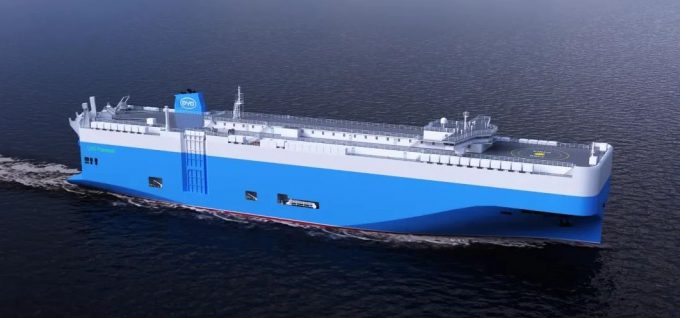With the US and EU putting up barriers, Chinese EVs could divert to SE Asia
Automotive intelligence company Jato has identified a lucrative alternative market for Chinese electric vehicle (EV) ...
TFII: SOLID AS USUALMAERSK: WEAKENINGF: FALLING OFF A CLIFFAAPL: 'BOTTLENECK IN MAINLAND CHINA'AAPL: CHINA TRENDSDHL: GROWTH CAPEXR: ANOTHER SOLID DELIVERYMFT: HERE COMES THE FALLDSV: LOOK AT SCHENKER PERFORMANCEUPS: A WAVE OF DOWNGRADES DSV: BARGAIN BINKNX: EARNINGS OUTODFL: RISING AND FALLING AND THEN RISING
TFII: SOLID AS USUALMAERSK: WEAKENINGF: FALLING OFF A CLIFFAAPL: 'BOTTLENECK IN MAINLAND CHINA'AAPL: CHINA TRENDSDHL: GROWTH CAPEXR: ANOTHER SOLID DELIVERYMFT: HERE COMES THE FALLDSV: LOOK AT SCHENKER PERFORMANCEUPS: A WAVE OF DOWNGRADES DSV: BARGAIN BINKNX: EARNINGS OUTODFL: RISING AND FALLING AND THEN RISING

The new year has seen a flood of orders for new car-carrier vessels, some from motor manufacturers opting to order their own ships to try and shift the logjam in automotive supply chains.
One expert explained that the industry was experiencing major congestion, from a shortage of truck drivers and equipment such as low loaders, and not enough vessel capacity to meet increasing demand, boosted by requirements for more electric vehicles.
He said: “One manufacturer, with 250,000 build slots annually, now has 450,000 cars ordered, with the higher-range and more expensive cars taking up to two years to deliver.”
Chief customer officer at Wallenius Wilhelmsen (WW) Pia Synnerman told The Loadstar: “We are constantly adapting our plans and capacity to ensure a reliable flow of cargo onboard our vessels, in the ports, terminals or our processing centres. Unfortunately, despite outstanding efforts, we are not always able to meet the strong demand from our customers.”
According to Ms Synnerman, the easing of semiconductor availability issues seen last year is leading to growing demand for light and commercial vehicles, also encouraged by new regulations and purchasing incentives.
WW also pointed to a lack of truck drivers, which is preventing terminal operators delivering cars to retailers. Ms Synnerman said data from industry associations revealed a driver shortage of around 400,000 in the EU.
A spokesman at Haropa Ports said: “The shortage of truck drivers affects all the ports in Europe.”.
Thus, these critical congestion issues have led motor manufacturers to take matters into their own hands. China automobile maker BYD Auto has placed firm orders for two 7,000-unit pure car and truck carriers (PCTCs) with Guangzhou Shipyard (GSI). The dual-fuelled vessels, diesel and LNG, and are expected to be delivered in 2025, each costing $90m to $93m. Reportedly, BYD may order up to eight.
Meanwhile, orders for PCTCs are flooding into shipyards.
South Korea’s H-Line Shipping has ordered two 8,600-unit PCTCs at GSI, following an order in February 2022 for five PCTCs, four 7,000-units and one 8,600-unit for long-term charter to Hyundai Motor’s transport arm, Hyundai Glovis.
China’s SAIC Anji, the supply chain subsidiary of China’s auto manufacturer SAIC, has reportedly ordered a dozen 8,900-unit car carriers, each costing $100m.
SAIC and BYD’s compatriot competitors, JAC Motors and Chery Automobile, have gone a step further and established Anhui Hangrui International Ro-Ro Transportation Co with Anhui Provincial Port and Shipping Group.
And established ro-ro operator Grimaldi has also increased its newbuilding programme to meet the burgeoning demand. It exercised options for five more ammonia-ready 9,000-unit PCTCs, which follows an initial contract in October for 10 ships. Grimaldi now has 15 PCTCs on order.
MD Emanuele Grimaldi said that 10 would serve the Far East trade, targeting China’s burgeoning automobile industry. The Italian ro-ro specialist has a $2.5bn fleet renewal project, involving 25 newbuilds.
Comment on this article